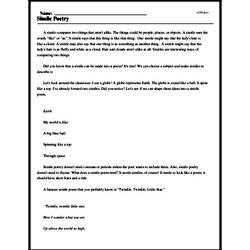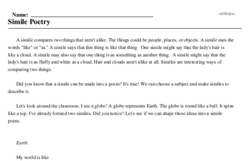Simile Poetry
A simile compares two things that aren't alike. The things could be people, places, or objects. A simile uses the words "like" or "as." A simile says that this thing is like that thing. One simile might say that the lady's hair is like a cloud. A simile may also say that one thing is as something as another thing. A simile might say that the lady's hair is as fluffy and white as a cloud. Hair and clouds aren't alike at all. Similes are interesting ways of comparing two things.
Did you know that a simile can be made into a poem? It's true! We can choose a subject and make similes to describe it.
Let's look around the classroom. I see a globe! A globe represents Earth. The globe is round like a ball. It spins like a top. I've already formed two similes. Did you notice? Let's see if we can shape those ideas into a simile poem.
Earth
My world is like
A big blue ball
Spinning like a top
Through space
Simile poetry doesn't need commas or periods unless the poet wants to include them. Also, simile poetry doesn't need to rhyme. What does a simile poem need? It needs similes, of course! It needs to look like a poem; it should have short lines and a title.
A famous simile poem that you probably know is "Twinkle, Twinkle, Little Star."




